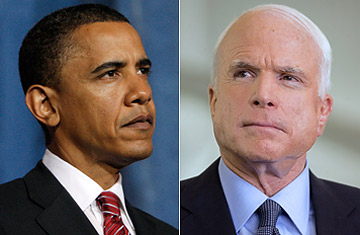
Democratic presidential candidate Barack Obama, left, and Republican presidential candidate John McCain
John McCain is trying to take the halo off Barack Obama and portray him as a typical flip-flopping politician. "He's a calculating politician," Senator Lindsey Graham, a top McCain ally, says of Obama in a typical remark. Obama is making the Republicans' work easy. He is changing position after position, at the cost of sullying his reputation as a man who wants to change politics as usual. The candidates' strategies dovetail perfectly — which means one of them is making a big mistake.
In recent weeks Obama has abandoned or downplayed his previous commitments on wiretaps, the pace of withdrawals from Iraq, trade with Mexico and Canada, guns, and the funding of his campaign. In most of these cases he has been moving to the center. In all of them he is taking the position most advantageous for his campaign in the fall. Left-wing bloggers, notably Arianna Huffington, have been screaming in cyberspace.
McCain, meanwhile, has hit on his campaign theme: "country first." The idea is that he puts the national interest above his personal ambitions, unlike certain Democratic presidential nominees. An attack on Obama's convenient flip-flops is an important part of that story. A Republican spokesman says, "There appears to be no issue that Barack Obama is not willing to reverse himself on for the sake of political expedience."
The obvious risk of McCain's gambit is that it will remind people of his own flip-flops. He used to oppose extending the Bush tax cuts, but now favors it. He used to oppose offshore drilling, but changed his mind. His list of reversals, like Obama's, goes on.
There are subtler risks as well. Earlier this year, Republicans seemed to have settled on the view that Obama was a committed left-winger. On social issues, they said, he made John Kerry look like a conservative. Kerry had encouraged states to pass constitutional bans on same-sex marriage. Obama opposes such bans. But Republicans cannot make the case that Obama is a dangerous radical at the same time they claim that he believes in nothing except getting elected.
Obama knows which charge he fears more. His moves suggest that he would rather be called a flip-flopper than a leftist. His repositioning does not truly risk costing him the support of liberals. They have been enthusiastic about ending Republican rule in Washington for years, before most of them knew Obama's name. Bush and McCain will keep them motivated even if Obama does not.
The passion Obama inspired earlier this year was critical to his victory in the primaries. But it isn't what he needs now. The public is not looking for a political messiah. Indeed, the over-the-top adulation of Obama's most fervent admirers probably strikes some swing voters as creepy and cultish. What people want is a steady leader who looks out for their interests: safety, secure health care, higher wages, cheaper food and gas.
All year, polls have shown that the public would strongly prefer to elect a Democratic President in November. But Obama has been running only slightly ahead of McCain. Being a typical Democratic politician would not be a step down for Obama — it would be a step up for him. The public knows that politicians are what they are, and that their rhetoric will not fill their bank accounts. They will see through Obama, and they will see through McCain, and in a Democratic year that will leave Obama ahead.
Toward that end, Obama can get away with flip-flops as long as they don't make him look weak or indecisive, and as long as he doesn't say anything as ripe for mockery as Kerry's "I voted for it before I voted against it." Perhaps Obama is being cynical. But he may also have a shrewder grasp of the public mood than McCain.
